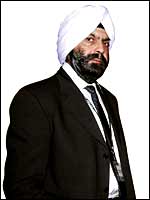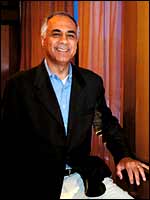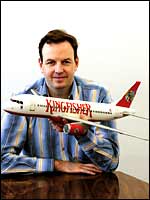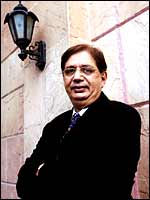|
 Everybody
in India knows that ICICI Bank is the most aggressive bank in
the business. And most people also know that Chanda Kochhar,
the bank's 43-year-old Executive Director, is one of the prime
drivers of its retail strategy. Not surprising, then, that the
influential Asian Banker magazine should pick Kochhar's ICICI
from among 70 banks in 14 countries for the Retail Banker Award
2004. Kochhar, according to the award citation, "exemplifies
the extent to which a banker can influence the banking services
of a nation". That's no exaggeration. Over the last five
years, Kochhar, an MBA from Jamnalal Bajaj, has led the huge transformation
of the bank's retail business, making it the #1 player in retail
banking. It has more than 10 million customers, and a 30 per cent
share in loans. Says Kochhar: "For the bank as a whole, we
should be setting best practices for global bankers to follow."
Now that's a target worth shooting at. Everybody
in India knows that ICICI Bank is the most aggressive bank in
the business. And most people also know that Chanda Kochhar,
the bank's 43-year-old Executive Director, is one of the prime
drivers of its retail strategy. Not surprising, then, that the
influential Asian Banker magazine should pick Kochhar's ICICI
from among 70 banks in 14 countries for the Retail Banker Award
2004. Kochhar, according to the award citation, "exemplifies
the extent to which a banker can influence the banking services
of a nation". That's no exaggeration. Over the last five
years, Kochhar, an MBA from Jamnalal Bajaj, has led the huge transformation
of the bank's retail business, making it the #1 player in retail
banking. It has more than 10 million customers, and a 30 per cent
share in loans. Says Kochhar: "For the bank as a whole, we
should be setting best practices for global bankers to follow."
Now that's a target worth shooting at.
 Hot
Property Hot
Property
Not too long
ago, he was their rival in the international markets. Now, he'll
be advising them on their India strategy. Teva Pharmaceuticals,
the $4.8-billion (Rs 21,120-crore), Israel-based generics giant,
recently roped in former Ranbaxy CEO, Devinder Singh Brar,
to advise them on India. When contacted, Brar wouldn't deny or
confirm the development, although he did say that he currently
has three consulting assignments. That apart, Brar is the Chairman
of GVK Biosciences, a Hyderabad-based services company where Sanjay
Reddy of the GVK Group is an equal partner. Barely a year old,
GVK Biosciences already has 480 employees on its payrolls and
plans to up the number to 760 by the end of this year. So why
consult? Says Brar, who divides time between Delhi, where his
home is, and Hyderabad: "It keeps me busy and abreast of
developments in the pharma industry." Not that there was
any real risk of his losing touch.
 Talking
Nano Talking
Nano
Promod Haque,
57, may have fallen seven places on Forbes' Midas List 2005 (which
ranks venture capitalists) to #8, but he's staying with his big
picture. Which, in his case, is nanotechnology. Haque's firm Norwest
Venture Partners, where he's a managing partner, already has a
$40-million (Rs 176-crore) investment in California-based Nano-Tex,
but his big nanotech story could well get written in India. "Eventually
you could see the emergence of (nanotech) product companies in
India," says Haque. His other big bet: a sub-$20 (Rs 880)
handset, which, he says, could be a $1-billion (Rs 4,400-crore)
market.
 Flight
Of Fancy? Flight
Of Fancy?
Alex Wilcox
is a man on a mission. Barely 35 and coo of Vijay Mallya's newly-launched
value airline, Kingfisher Airlines, Wilcox is promising profits
in year one. In the notoriously unprofitable industry-at least
in the US from where he comes-that must sound incredible. Yet,
Wilcox, who worked with JetBlue before he signed up with Kingfisher,
says he knows what he's doing. "This is a tremendous market;
every plane you add fills up in no time," says the native
of Florida. But isn't Kingfisher's low-cost, full-service model
more risky than, say, Air Deccan's no-frills strategy? "I
bring in extensive knowledge of the aviation business and my Indian
colleagues know the Indian consumer. Together, I think we have
created a unique product that will do very well," says the
man who's been having tandoori for lunch almost every day. We'll
be watching.
 Publishing
Bug Publishing
Bug
Once a publisher,
always a publisher. at least for Hoshang Billimoria, former
Vice Chairman and Managing Director of Tata Infomedia. Last year,
icici Venture snapped up the Tata company, leading to Billimoria's
exit and a change in management. Now, the 53-year-old has resurfaced
as the CEO of Next Gen Publishing, an outfit promoted by the Forbes
Group and HDFC. "The publishing bug was too strong,"
grins Billimoria. The company has already launched the Forbes
Yellow Pages in Ahmedabad and New Delhi, besides Smart Photography,
a monthly. He is now looking at more magazine titles, including
some specialised international ones (he wouldn't reveal which).
In another five years or so, he hopes to cobble together a sizeable
empire, comprising 20 periodicals. Looks like Billimoria's second
coming may be more interesting than the first.
-Contributed by Roshni Jayakar,
R. Sridharan, Rahul Sachitanand, Kushan Mitra and Shailesh Dobhal
|




 E
E Hot
Property
Hot
Property Talking
Nano
Talking
Nano  Flight
Of Fancy?
Flight
Of Fancy? Publishing
Bug
Publishing
Bug